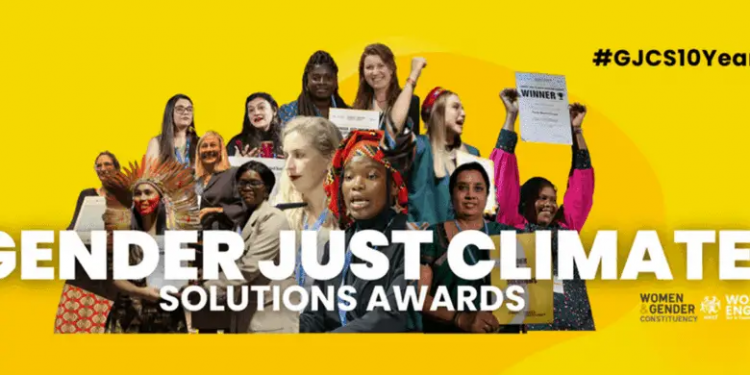The Women and Gender Constituency (WGC) is one of the nine stakeholder groups of the United Nations Framework Convention on Climate Change (UNFCCC). Established in 2009, the WGC now consists of 64 women’s and environmental civil society organizations, that are working to ensure that women’s voices and their rights are embedded in all processes and results of the UNFCCC framework, for a sustainable and just future, so that gender equality and women’s human rights are central to the ongoing discussions.
In 2015, the WGC launched its first Gender Just Climate Solutions Awards. These awards aim to showcase concrete examples on how to center gender equality and women’s rights in climate action. WGC know the solutions to a more sustainable future already exist and it is time to upscale them far and wide, and demand change.
Winning initiatives are showcased across three different project types:
- Technical climate solutions that are gender-responsive focusing on technologies, i.e. water, renewable energy, food production or transformation, digitalization, waste reduction, etc.
- Non-technical climate solutions that are gender-responsive focusing on behavioral change, mutual learning, skills sharing, capacity strengthening, etc.
- Transformational climate initiatives that are gender-responsive focus on governance, institutional or societal change, and challenging patriarchal norms.
Eligibility
- All types of activist, grassroots and women-led, and gender equality organizations
- Groups working on issues related to climate change from all over the world are encouraged to apply.
- Only non-governmental initiatives are eligible (local or national government initiatives cannot be considered).
- The project/initiative should either have been completed or be in current operation for at least a year.
- The initiative must fit within one of the 3 award categories of projects.
Criteria
Initiatives will be weighed against the following criteria aimed to measure contributions to gender equality, resilience, and sustainability. Winning projects will ideally work across all key result areas, though the organizers note that not all projects will be in a position/stage to meet every criterion. Due to existing inequalities and a lack of available resources globally, priority will be given to women and gender-non-conforming-led initiatives, recognizing that programs do not necessarily need to be women-led to be gender-just.
Result Area 1: Women’s rights and gender equality
- Provides equal access to benefits for women, men, gender non-conforming, and youth.
- Aims to alleviate and/or does not add additional burden to women’s workload (such as via additional natural resource management or care responsibilities without compensation).
- Empowers women through better mobility/accessibility, enhanced livelihood security, enhanced food security, improved health, access to safe water, etc. (as many benefits as possible).
- Promotes women’s democratic rights and participation by ensuring decision-making by local women, men, women’s groups, cooperatives, and communities.
Result Area 2: Climate Resilience
- Locally led and/or locally driven (decentralized and appropriate).
- Ensures self-sufficiency & a low input of resources (safe, affordable, and sustainable).
- Contributes to climate change mitigation, emissions reduction, and/or climate adaptation (the project is sustainable).
Result Area 3: Scaling-up and transfer
- Results can be shared, spread & scaled up (replicable elsewhere, not just benefiting one individual).
- Shows interlinkages to cross-cutting issues, such as (including, but not restricted to) peace-building, natural resources management, food security and/or health, water, and sanitation.
Selection & Award
Initiatives will be reviewed by an international jury with members of the Women and Gender Constituency. Two tiers of ‘Winners’ will be selected:
- Three top ‘Award Winners’ will be identified, one per project type. These three winners will each receive a Monetary Award of 5000 Euros and travel for one representative to attend the Awards Ceremony held at COP30 in Belem, Brazil this November 2025 (please note that attendance at the COP is subject to the availability of quotas granted by the UNFCCC).
The ‘Award Winners’ are invited to a capacity-building workshop with some of the previous awardees of the Gender Just Climate Solutions 2015-2023. The workshop includes training to up-scale their solutions, share their experience and expertise with each other, as well as to network.
CLICK HERE TO APPLY










